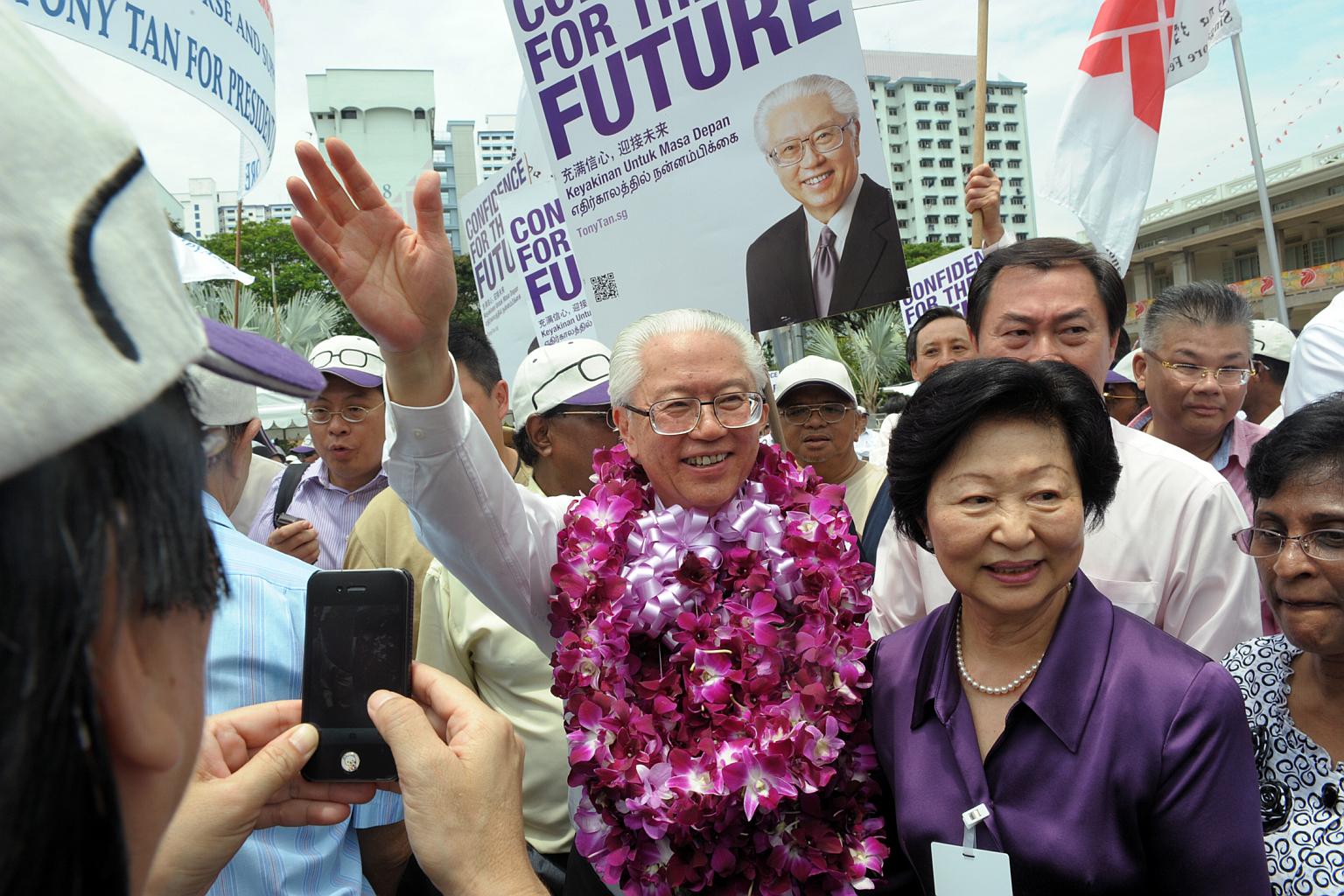Elected presidency report: Panel suggests returning to appointed presidency
Sign up now: Get ST's newsletters delivered to your inbox

Dr Tony Tan Keng Yam (centre) and his wife Mary waving to supporters at the People's Association headquarters on Nomination Day, Aug 17, 2011, during the Presidential Election.
PHOTO: ST FILE
SINGAPORE - To resolve the tension between the symbolic and custodial roles of the President, a panel tasked with reviewing the elected presidency has suggested that the Government consider "unbundling" those functions at some point.
In its report published on Wednesday (Sept 7), the Constitutional Commission also floated the idea of doing away with elections and having Parliament appoint a head of state who will focus on the historic role of being a symbolic, unifying figure for the nation.
The President's custodial role of safeguarding the reserves and the integrity of the Public Service could be assumed by a group of appointed experts instead.
As the person holding the second key to past reserves - a role introduced when the office was transformed into an elected one in 1991 - the President could potentially have to confront the Government.
"While the prospect for confrontation necessitates that the President hold the legitimacy and authority that comes from having an elected mandate, it seems out of place for persons seeking a non-partisan unifying office to have to go through a national election, which will likely be politicised and divisive," the commission said.
So it has suggested returning to the pre-1991 system of having an appointed president.
A specialist body could then be appointed to take over the President's functional role.
This suggestion was first mooted by Raffles Medical Group executive chairman Loo Choon Yong and his brother Choon Chiaw, a lawyer, during a public hearing held by the commission in May.
While acknowledging that the matter was clearly beyond its terms of reference and a political question, the commission said that in the course of its review, it considered how any weakness in the Elected Presidency could be overcome by an alternative design.
In laying out its proposals on decoupling the roles and returning to an appointed president, the commission said its views provide context for further debate on the issue, "if the Government deems it fit and profitable".
The Government has already reiterated the importance of having an elected president.
In a recent interview with Mediacorp, Prime Minister Lee Hsien Loong said Singapore's President must remain elected because he has custodial powers over the use of financial reserves and a mandate is needed to exercise those powers.
Without an elected mandate, it will be very difficult for the President to say "No" to an elected government that wants to use the nation's reserves, he said.
"As long as there's no such situation, it's fine. If you actually have to wield those powers and say 'No', I think it will not work," said PM Lee. "So if you want to have a safeguard, then you must have an election."
In its report, the commission said the presidency should remain an elected office if it retains its custodial functions. Yet this key role as a "check" on the Government might incentivise presidential candidates to campaign on an anti-government platform, and clash with the authorities over policies after being elected, it said.
The commission also noted that individuals who have the qualifications and expertise to exercise the President's custodial powers may not also possess the traits required for the symbolic role - namely the ability to connect with and represent the general populace.
It proposed separating the President's custodial role by having an appointed council of experts that could delay government measures, force a debate on them and require a super-majority in Parliament to override its objections.
However, such a council would lack the powers to absolutely block or veto government initiatives.
There should be strict eligibility criteria for members, to ensure the council functions independently and has the necessary expertise to carry out its supervisory role, the commission said.
It said it took guidance from the Westminster system, where the House of Lords - the second chamber of the British Parliament where members are mainly appointed - has the power to delay, but not block, the vast majority of Bills passed.
As for whether an appointed President could function as a check on the Government, the commission said it is critical that someone in this role be independent.
It said: "With the appointed body taking over the elected president's custodial role, the President can then focus on his historical role of being a symbolic unifying figure."


